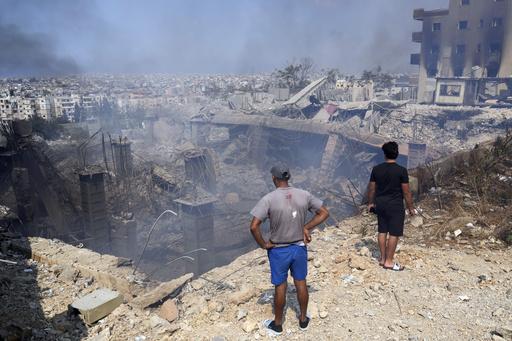
BEIRUT — Hezbollah, the Lebanese militant group, finds itself more vulnerable than ever following the rapid insurrection that led to the downfall of former Syrian President Bashar Assad, a key ally. This upheaval has significantly weakened Hezbollah, impacting its strength and operational capabilities.
The lengthy conflict with Israel has already drained Hezbollah over the last 14 months, leaving the group with diminished resources. The ousting of Assad, who maintained strong connections with Iran, has critically severed a crucial supply route for weaponry that previously flowed through Syria. As a result, Hezbollah is now grappling with a landscape that hinders its ability to recover.
Despite these challenges, Hezbollah representatives remain optimistic. “What is happening in Syria is a major, dangerous and new change, and to know why this happened needs evaluation,” stated Hassan Fadlallah, a Lebanese lawmaker associated with Hezbollah, during a recent funeral ceremony for militants killed by Israeli forces. He asserted that the ongoing turmoil in Syria, although concerning, would not lead to Hezbollah’s downfall.
Political analysts predict that the decline of Hezbollah will have significant repercussions for Lebanon, a nation where the group has long been an influential political force. Iran, which has depended on Hezbollah as a vital proxy for projecting its influence in the region, also faces a shift in its strategy, while Israel may now find itself confronting a weakened adversary situated on its northern border.
The power dynamics within Hezbollah have historically been linked to Syria’s Assad regime, which fortified the group since its inception in the early 1980s. Syria served as a critical pathway for arms from Iran and a training hub for Hezbollah fighters. The Assad government relied heavily on Hezbollah’s military strength, especially during the civil war that erupted in 2011 when thousands of Hezbollah fighters rallied to Assad’s side.
However, as December brought further gains for the insurgents, particularly the capture of Homs — a region close to Hezbollah’s stronghold — expectations ran high for a fierce resistance from the group. Yet, Hezbollah’s response was markedly disorganized, as Israeli airstrikes had already decimated many of its leading figures and military infrastructure.
“The regime’s fall signifies the end of Iran’s armed influence in both Syria and Lebanon,” declared Lt. Col. Fares al-Bayoush, a defected Syrian officer who fought against Assad and Hezbollah forces until 2017.
In Lebanon, the waning power of Hezbollah offers the national army an opportunity to regain authority, particularly along the southern borders where Hezbollah’s presence was previously uncontested. A ceasefire, facilitated by the U.S., emphasizes that Hezbollah’s armed activities should cease in these areas, sparking increased advocacy for the group’s disarmament inside Lebanon.
Samir Geagea, head of the Christian Lebanese Forces Party, expressed that for Hezbollah, “it’s game over,” urging the group to collaborate with the Lebanese military to renounce its armed status in favor of becoming a political party.
Nonetheless, Hezbollah faces mounting opposition in the political sphere. There is growing frustration among Lebanese citizens regarding Hezbollah’s actions, particularly as the group launched rockets into Israel following attacks by Hamas. With nearly 4,000 fatalities reported during the conflict with Israel, numerous towns populated by Hezbollah supporters have been devastated, leading to more than a million people displaced and an economy already in disarray sinking deeper into crisis.
Firas Maksad of the Middle East Institute highlighted the necessity for Lebanese leadership to understand the significant transformations occurring. Even figures who once aligned with Hezbollah, such as Gebran Bassil from the Free Patriotic Movement, are reevaluating their stance, suggesting that the removal of Hezbollah’s arms supply route from Iran presents an opportunity for Lebanon to disengage from regional strife.
Analysts note that Hezbollah may need to readjust its ambitions in light of political circumstances. With the fall of Assad, Iran has lost oversight of a critical land corridor that extended through Iraq and Syria to the Mediterranean, disrupting the flow of resources to Hezbollah.
“They can perhaps still smuggle some supplies, but it will not be at the scale we’ve seen before,” remarked Aron Lund, a Syria expert.
For Israel, dismantling Iran’s influence in the region has been a key objective, albeit with caution regarding the Islamic militant factions among the insurgents responsible for Assad’s removal. On Sunday, Israel deployed military units into a demilitarized zone near the Golan Heights as a precautionary move, with Prime Minister Benjamin Netanyahu marking Assad’s fall as a pivotal moment, attributing this change directly to aggressive actions taken against Hezbollah and its Iranian backers.
